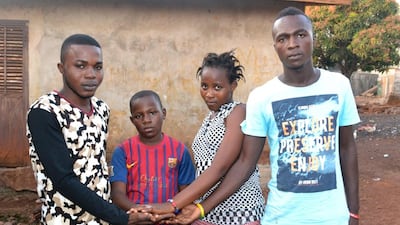Conakry, Guinea // Saa Mathias Lenoh, a high school student in the Guinean capital Conakry, is “learning to smile little by little” – like thousands of other youngsters orphaned by Ebola in west Africa.
According to the United Nations, more than 22,000 children lost at least one parent to the deadliest Ebola outbreak in history whose epicentre lay in the west African countries of Guinea, Sierra Leone and Liberia.
“The children really suffered at the start. The moment one came to know of illness in the family, they were automatically stigmatised,” said Yaya Diallo, an official with Plan International, a leading global NGO.
“The neighbours and even neighbourhood children who would play with them and went to school with them were forbidden by their parents to do so,” he said.
“Their own parents in turn would virtually lock them up at home or send them to communities very far away so that they would not have to suffer,” Mr Diallo said.
The outbreak initially led to a knee-jerk reaction from locals, and children from affected families often bore the brunt of ignorance and prejudice.
In one particularly horrific case in neighbouring Liberia, Fatu Sherrif, 12, was locked into her home with her dead mother in the quarantined hamlet of Ballajah, 150 kilometres from the capital Monrovia, as panicked neighbours fled to the forest.
Her cries could be heard for several days by the few who had stayed in the abandoned village before she died alone, without food or water.
International organisations deplored the lack of traditional solidarity to those affected this time round in contrast to earlier times, such as when AIDS had ravaged the continent.
But since then, nearly all those children have been taken in by foster families or are in care, the UN childrens’ agency Unicef noted.
“Today, no study shows that a child is on the streets because his parents have died of Ebola,” Mr Diallo said.
But despite this, many children have suffered.
“Life has been difficult,” said Lenoh, 18, who lost a sister and both his parents to the disease in October 2014.
“If it hadn’t been for my elder brother, I don’t know how I would have continued my studies,” he said.
“Luckily nobody in my school knows that I’m an Ebola survivor except the principal who I took into confidence. He encourages me and comforts me often.”
His elder brother Emmanuel was not so lucky.
“I was forced to stop going to university and start working,” he said. “I lost both my parents in the span of a week.”
Emmanuel said his mother, a trader, contracted the virus during one of her regular trips to Sierra Leone, and then infected other members of the family.
“Today, I cannot finish my studies. Otherwise without my help, the rest of the family can’t continue their studies.”
* Agence France-Presse

